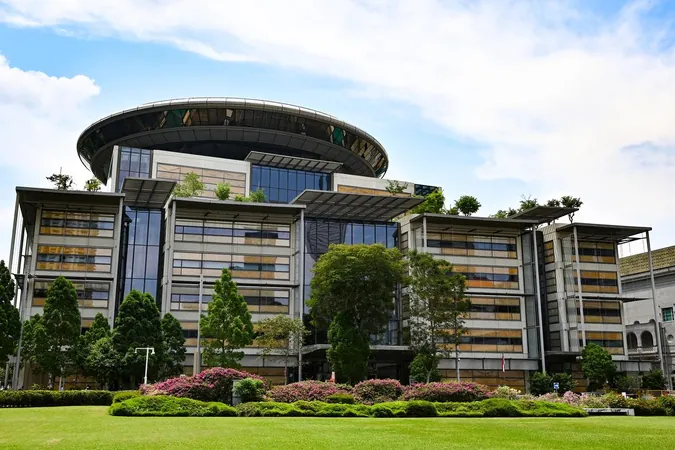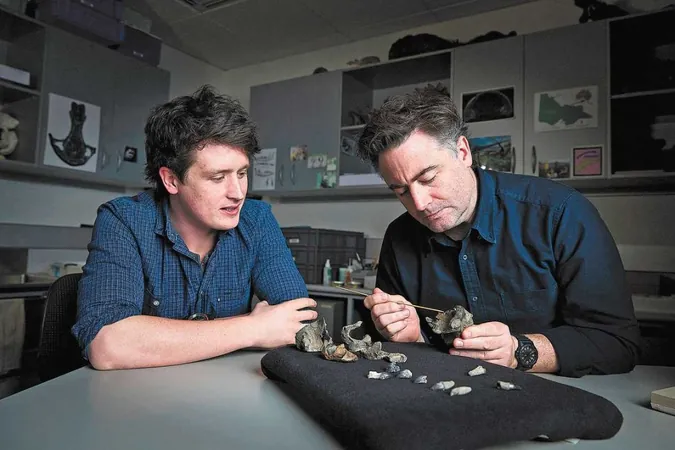
Shocking Discovery: Chemotherapy Could Be Accelerating Aging in Your Blood!
2025-07-02
Author: John Tan
Breakthrough Findings on Chemotherapy's Genetic Impact!
In a groundbreaking study, scientists have unveiled alarming insights into the genetic effects of chemotherapy on healthy tissues—a first in medical research! A collaborative team, including experts from the Wellcome Sanger Institute and Cambridge University, meticulously analyzed blood cell genomes from 23 patients of all ages who underwent various chemotherapy treatments.
Chemotherapy: A Double-Edged Sword
Published in *Nature Genetics*, the study reveals that numerous chemotherapy agents can spark mutations and hasten the aging process in healthy blood tissue. This discovery may reshape how we approach cancer treatment, potentially leading to therapies that are effective while limiting harmful side effects.
Exploring the Shadows of Cancer Treatment
Despite chemotherapy's life-saving potential in battling cancer, it's long been known to carry risks like secondary cancers. Yet, the biological mechanisms behind these effects remain poorly understood. With the advent of cutting-edge genomic technologies, researchers are able to dive deeper into how chemotherapy damages normal cells and the long-term consequences of such harm.
A Closer Look at Blood: The Study's Focus
Why blood? The Mutographs team opted for blood samples due to ease of collection and the possibility of laboratory culture. Blood’s mutation patterns are consistent among individuals, offering a reliable baseline to measure the effects of chemotherapy.
Startling Results from Blood Cell Genomes
The team sequenced the genomes of blood cells from participants, aged three to 80, treated for various cancers. The findings were alarming—many chemotherapy agents produced significantly higher mutation rates in blood cells. Notably, a three-year-old with neuroblastoma exhibited mutations typically seen in 80-year-olds who never underwent chemotherapy!
Decoding DNA Damage: A New Perspective
By examining the mutational signatures of different chemotherapeutics, researchers identified four novel patterns associated with chemotherapy. For instance, while some platinum-based drugs wreaked havoc on DNA, others, like oxaliplatin, did not.
Aging Blood Cells: What’s at Stake?
The study also highlighted significant changes in hematopoietic stem cells—the vital producers of blood. In a concerning twist, chemotherapy appeared to mimic natural aging processes, worsening diversity in these stem cells more rapidly than normal aging would.
Can Genomic Data Lead to Safer Treatments?
Looking ahead, the researchers propose that genomic insights could inform safer chemotherapy choices, particularly for children, minimizing premature aging effects and the risk of secondary cancers later in life. This critical knowledge could change how we navigate cancer treatments!
Experts Weigh In: A Call for Change
Dr. Emily Mitchell, a key author, emphasized the importance of understanding chemotherapy's broader impacts on healthy tissues. The ultimate goal? To refine patient treatment plans, maximizing efficacy while minimizing harm. Co-author Dr. Jyoti Nangalia echoed these sentiments, advocating for integrating genomic data into future therapies.
A Bright Future for Cancer Treatment?
The revelations from this study have the potential to revolutionize cancer treatment strategies. With relentless efforts towards optimizing chemotherapy and reducing toxicity, there's hope that each patient's journey through cancer can be safer and more effective.
In the quest against cancer, this study is a crucial step forward. As researchers continue to explore the protective benefits of genomic information, patients may soon receive not only better treatments but also a brighter outlook for their health!




 Brasil (PT)
Brasil (PT)
 Canada (EN)
Canada (EN)
 Chile (ES)
Chile (ES)
 Česko (CS)
Česko (CS)
 대한민국 (KO)
대한민국 (KO)
 España (ES)
España (ES)
 France (FR)
France (FR)
 Hong Kong (EN)
Hong Kong (EN)
 Italia (IT)
Italia (IT)
 日本 (JA)
日本 (JA)
 Magyarország (HU)
Magyarország (HU)
 Norge (NO)
Norge (NO)
 Polska (PL)
Polska (PL)
 Schweiz (DE)
Schweiz (DE)
 Singapore (EN)
Singapore (EN)
 Sverige (SV)
Sverige (SV)
 Suomi (FI)
Suomi (FI)
 Türkiye (TR)
Türkiye (TR)
 الإمارات العربية المتحدة (AR)
الإمارات العربية المتحدة (AR)